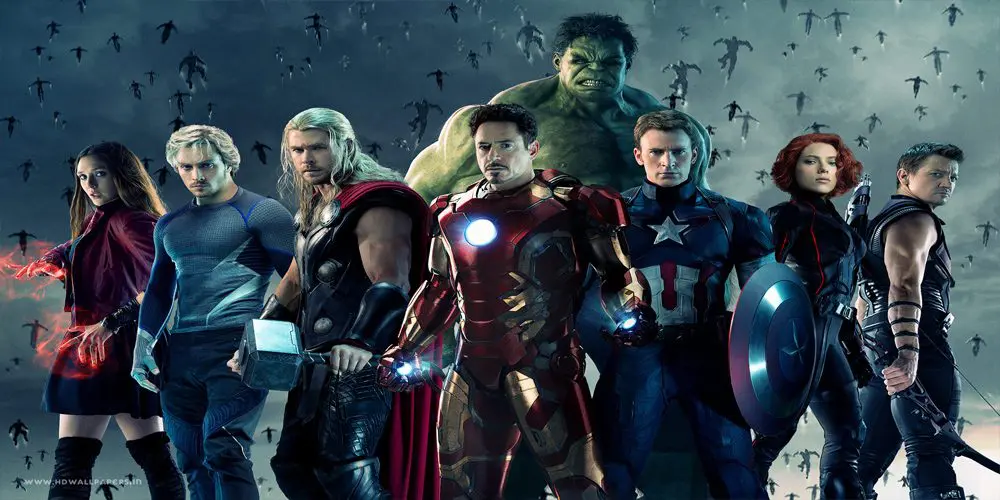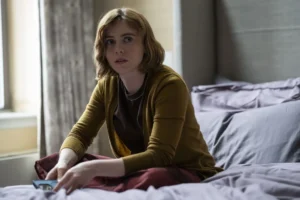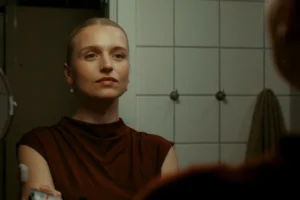Summary
Avengers: Age of Ultron is still a very good movie, but it was the first to feel truly overburdened by Marvel’s franchise-building obligations.
The best scene in Avengers: Age of Ultron is, unsurprisingly, one we saw in the trailers, which I had the pleasure of reviewing. It’s not the bit in which Tony Stark (Robert Downey Jr.) dons the Hulk-buster armor to battle Mark Ruffalo’s not-so-jolly green giant, though, nor is it the lead-up to that instantly iconic overhead shot of the Avengers arranged in a circle, attacking in all directions.
Both of those moments are fun, but they don’t get to the heart of what it is that made 2012’s The Avengers or 2014’s Guardians of the Galaxy such great movies. The best scene in Age of Ultron is where the gang, during some much-needed downtime, sits around sipping cold ones and taking turns trying to lift Thor’s (Chris Hemsworth) hammer, Mjolnir.
Avengers: Age of Ultron (2015) Review and Plot Summary
The secret to the relentless success of the Marvel Cinematic Universe is that we really like these characters. Writer-director Joss Whedon likes them too, and his specialty is adopting dysfunctional surrogate families such as this one.
As a writer, he’s at his best when a movie comes up for air. By necessity, there aren’t many moments like that in Age of Ultron, even though it’s two and a half hours long; he makes the most of the few there are, and whenever he’s back in his element, the chemistry between these marquee leads begins to spark and reignite.
But the novelty has worn off. As a director, Whedon is less convincing. He’s at once trying to do too much and not enough.
The “too much” begins right away, as we catch up with the Avengers in medias res amid an assault on one of the few remaining Hydra strongholds. This one contains not only the metahuman twins, Wanda (Elizabeth Olsen) and Pietro Maximoff (Aaron Taylor-Johnson), but also Loki’s scepter – the key, it turns out, to artificial intelligence.
Whedon treats us to a long traveling shot of the heroes operating at full speed, bouncing off one another both figuratively and, in some cases, literally, as they each get a moment of individual action. It’s a smart way of reintroducing these characters (most of whom have their own franchises) as a team.
Yet you get the impression that this kind of cohesion is as good as it’s going to get. When you begin with near-perfect symbiosis, where do you go from there?
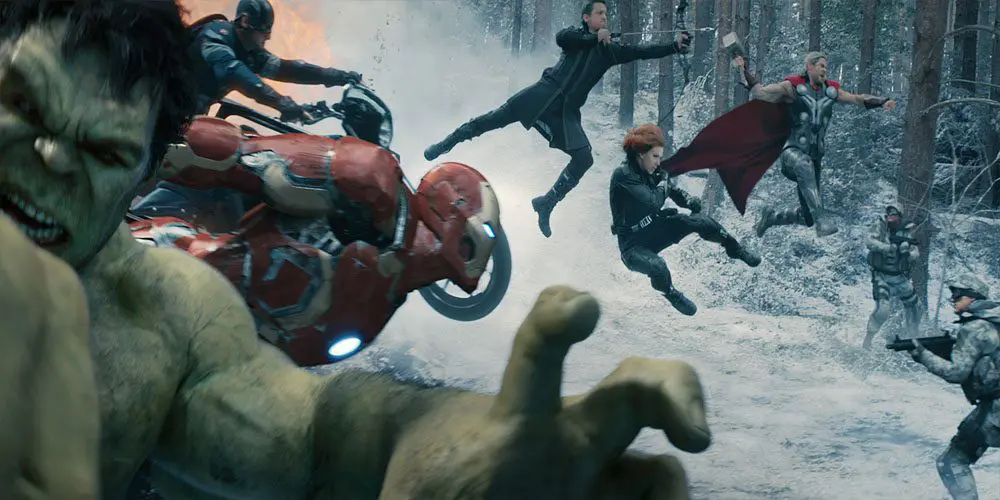
The answer is, predictably, in opposing directions. The seeds of discord are subtly sown: Stark sees the Avengers as a means to an end, one which will ultimately be supplanted by an autonomous peacekeeping force, a “suit of armour around the world”, as he puts it; Steve Rogers (Chris Evans) on the other hand, sees world-saving as a vocation for himself and his Captain America alter-ego – to him, the Avengers are a calling.
This ideological conflict leads to the creation of the film’s titular villain, Ultron (James Spader), as Stark and his science buddy Bruce Banner attempt to use Loki’s sceptre as the blueprint for an AI that will keep the world secure while the team take an indefinite vacation.
Avengers: Age of Ultron under-dramatizes both Stark’s general weariness and Banner’s eventual agreement to go along with the idea, although when it comes to the latter you get the impression from his puppy dog demeanor that arguing with Iron Man’s boisterous egotism is probably more trouble than it’s worth.
Ruffalo’s acting is still the most noteworthy among the entire cast; he lends the Hulk character a welcome vulnerability and an earnest guilty conscience. Of course, the Ultron system immediately becomes self-aware, within moments, deciding that its plan for world peace absolutely must include the extinction of both the Avengers and humanity itself.
Needless to say, that’s a considerably more genocidal retirement plan than Ultron’s creators had in mind.
Spader voices Ultron (recognizably, despite the robotic filter) as though he’s literally sinking his teeth into Whedon’s dialogue, but the film conceives of him as a kind of wacky madcap villain who flits between homicidal menace and zinging dark comedy frequently and without warning.
There’s supposed to be some insecurity there, and glitches in his programming, and daddy issues with Stark. He’s usually more nonsense than menace, though. His initial plan – that of hijacking the world’s nukes – is better than the one he eventually comes up with, but his every move on the internet is being countered by a mysterious third party, so he has to improvise.
Part of that improvisation is fashioning an escalating series of robotic exoskeletons for himself (at one point destroying the previous version mid-speech and just continuing on in a new body).
Another is recruiting the Maximoff twins (better known to comic book fans as Scarlet Witch and Quicksilver), who were orphaned by one of Stark’s bombs. Wanda’s powers are varied and massively underexplained, but among them is the ability to invade the headspace of the heroes, forcing them to confront their greatest fears and failings.
Quicksilver, meanwhile, is fast: fast enough to have a few cool moments of his own but not quite quick enough to outrun the fact that he doesn’t have anything as fun or interesting to do as the same character did in Bryan Singer’s X-Men: Days of Future Past.
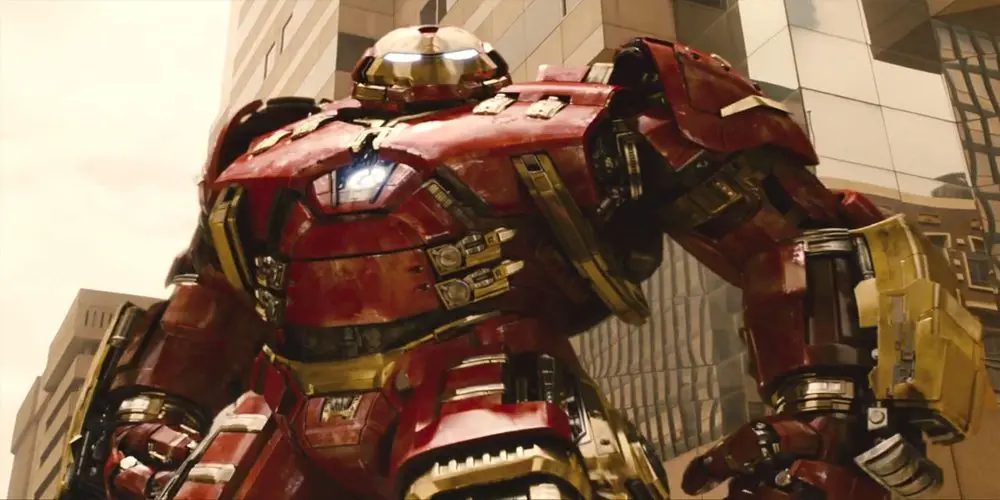
Wanda’s vaguely-defined telepathy, like Whedon’s writing, gets at the people behind the armored suits and magical hammers. Avengers: Age of Ultron seems to be committed to being fun, perhaps above all else, but it’s not afraid to drag the Avengers down to their lowest: Thoroughly beaten by Ultron, mistrustful of one another, and vilified in the eyes of the public they’re supposed to protect.
This is where Whedon is most assured, and his fascination with these characters’ humanity is infectious. Forced to lay low, the team takes up residence with Hawkeye (Jeremy Renner) and his heretofore unmentioned wife and children, settling into a weird pseudo-domesticity while they get their shit back together.
Hawkeye has been promoted from a flinty marksman with questionable utility to what can only be described as the moral centre of the entire story. Renner, who was disappointed with how little his character had to do in the previous film, is probably thrilled about this. I’m still of the opinion that he isn’t that interesting. At one point, he’s so bored by saving the world that he stops to discuss his home renovation plans. That kind of sums him up for me.
Avengers: Age of Ultron has a more engaging heart: the burgeoning relationship between Bruce Banner and Black Widow (Scarlet Johansson), which is a sweet idea that Whedon treats with sensitivity. It’s certainly out of left-field, but those are the relationships you tend to care about.
I just wish the movie itself had as much time for it as Whedon would evidently like, because it, like the other nonessential plot threads which don’t further Marvel’s grand Phase Three agenda, is often pushed into the margins.
Yet things like Thor’s pointless subplot is given screentime, as is an extended sequence involving Ulysses Klaw (Andy Serkis); these are things which in any other movie would have been immediately excised, but here remain in service of foreshadowing subsequent releases.
None of this extra weight capsizes the movie, but it certainly makes it inelegant. You can feel the lifting. I keep flashing back to that scene, each character taking turns in trying to lift the hammer. The whole movie is Whedon’s attempt.
There’s just so much ground to cover – reassembling the all-star ranks, devoting screentime to brand new characters, churning through one story, setting up another, building the mammoth set-pieces – that there simply isn’t enough time for any of it to breathe.
Whedon’s better with action this time, but even that eventually feels numbing. The frantic CGI (some of it very obvious) levels entire cities and even floats one in the air, but none of that is anywhere near as compelling as one bit where Thor smacks Mjolnir against Cap’s shield and knocks down a team of baddies with the resultant sound wave.
The movie’s full of little moments like that, but they’re suffocated within the chest-beating lunacy of those large-scale showdowns.

Typically, it’s the character stuff which works the best, there’s just barely enough time for it. Cap, Thor and Iron Man are shouldered with a lot of the action responsibility, while the pesky emotions are handed off to those characters without a franchise of their own. I’m okay with that.
But so many moments feel flatter as a result of it. Ultron’s relationship with Stark deserved more than a cursory acknowledgement, but it’s barely explored. Whedon tries to paper over it with the introduction of Vision (Paul Bettany), who is essentially Ultron’s son.
I imagine that’s the point where everybody just threw up their hands and said, “There’s no way we’re going to be able to explain this guy”. And they didn’t bother. He’s just inserted without any ceremony and treated as if he’s always been there. Nobody even tries to explain what his powers are, or why he has them. He’s the most comic book-y think I’ve ever seen on screen.
It’s unsurprising, really, given that Whedon is a true believer in comic book storytelling. He knows how to stage a shot to look like a live-action splash panel. He understands how comics work, that bonkers stuff can just be inserted without explanation.
But these movies, until now, have played by different rules. Nothing as clean and practical as, say, Captain America: The Winter Soldier could have sustained Vision’s weight. Age of Ultron can, just. It’s already over-capacity by the time he’s introduced. But you feel it. The whole thing creaks.
How does Avengers: Age of Ultron rank among the other Avengers movies?
I don’t want to give the wrong impression. Avengers: Age of Ultron isn’t a bad movie. I still had a lot of fun with it. There are many, many great scenes, great lines, great shots, ones which don’t necessarily make for great trailer moments, but just great movie moments.
There’s a particular way Black Widow calms the Hulk down that I liked a lot. Hawkeye’s relationship with Quicksilver is somehow funnier and more moving that I thought it would be. When the newly-conscious Vision stares at the lights of New York City outside Avengers Tower, there’s a weighty significance to it and I have no idea at all where that comes from. A joke about how square Captain America is gets repeated in various ways throughout the entire movie, and it’s funnier each time.
There’s a lot of stuff to like – to love, even. I just didn’t leave the theatre in the same kind of giddy trance I did back in 2012.
There was never a chance that Avengers: Age of Ultron would be as significant as its predecessor. Avengers Assemble was a game-changer, and there’s no way to replicate what it was like seeing these characters together for the first time. You can’t lose your virginity twice. But there was a chance – a likely one – that it would be a technically better movie.
Phase Two of the MCU has been characterized by near-constant improvement. Age of Ultron is the first movie which feels truly burdened by all the multitasking and corporate obligations. It’s the first which feels so thoroughly comprised of ones and zeroes.
The irony, of course, is that when it comes to box office figures, and revenue, there’ll be the same kinds of ones and zeroes attached to all Age of Ultron’s successes. Marvel Studios have their own superheroes: executive producer Kevin Feige and his marketing team.
What did you think of Avengers: Age of Ultron, and how would you review it? Comment below.

